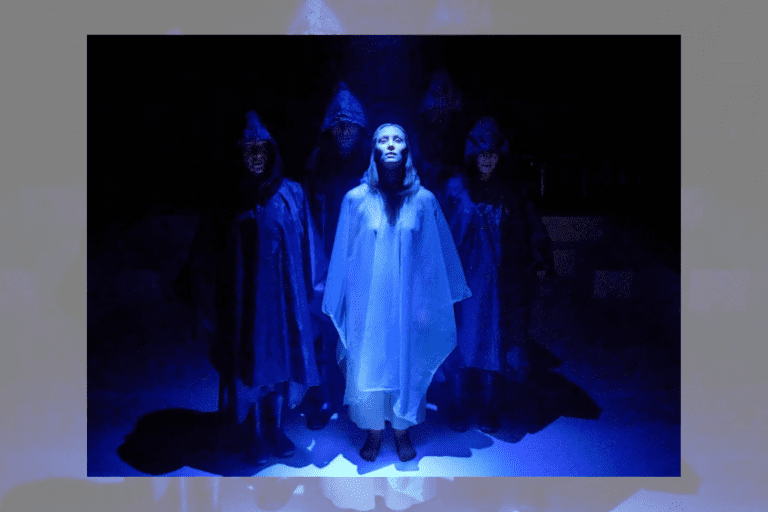REVIEW: Prodigal at Howland Company/Crow’s Theatre
There’s a “dinner party trope” in theatre: when everyone’s gathered at the table you know chaos is about to ensue. In Paolo Santalucia’s tense new take on the family drama, however, the table’s offstage and the chaos is in the kitchen.
The world premiere of Prodigal — from the local, award-winning Howland Company in association with Crow’s Theatre — is now on stage at Streetcar Crowsnest. Written and directed by Santalucia, Prodigal is set in the home of a prominent Toronto family helmed by Rowan (Rick Roberts) and Marilyn (Nancy Palk) Clark. Despite their material success, all is not well in the Clark family, and the unexpected homecoming of their estranged son Edmund (Dan Mousseau) sends the family and all those caught in its orbit reeling.
They say the kitchen is the heart of the home, so it’s fitting the action begins in the Clarks’ sleek, modern one (the set by Mark Hockin has everything you’d expect — including the kitchen sink!). We hear about the Clarks before we see them as chef Pauline (Meghan Swaby) and her husband and business partner, Quentin (Jeff Yung), cater the private engagement party of the Clarks’ eldest son, Henry (Cameron Laurie). Quentin shuttles dishes in and out of the dining room, relaying ridiculous requests from the family to a frustrated Pauline, who observes that Quentin is receiving all of the credit for the success of her dinner by default. The Clarks haven’t even considered that their chef could be a woman (female achievement being overlooked in contrast to male ambition is a common thread in the show). A familiar image forms. The Clarks are white, extremely privileged, and they like to complain because it makes them feel important. None of these assumptions are dispelled when the Clarks actually step on stage.
Throughout the evening, secrets start to be revealed. Edmund hasn’t been in contact with his family for quite some time, and though Marilyn and Rowan want to know he is safe, they are acutely aware that things run more smoothly with Edmund out of the picture. Their attitude towards Edmund has caused a rift in their relationship with their daughter, Violet (Hallie Seline), who is furious at everyone for acting as though Edmund doesn’t exist. To complicate matters, the family is under increased scrutiny as a result of a high-profile political appointment heading Rowan’s way. As a result, Rowan decides to close down the bank account to which Edmund had previously given unlimited access, fearing it may look suspicious (although shutting down the affair he’s having with the household manager, Simone, appears less urgent).
Cue chaos. Angry at having been cut off, a drunk Edmund crashes back into his family’s life with a visitor in tow — Simone’s brother, Levi (Michael Ayres). An outsider in his own home since childhood, as a gay man Edmund never felt true acceptance from his family. Now older, more cynical, and dealing with addiction, Edmund has very little to lose, and repairing his relationships with his family is the last thing on his mind.
The production’s strengths are its quippy, fast-paced dialogue and moments of laugh-out-loud comedic gold, as well as solid performances across the board from the cast. Mousseau is riveting as Edmund, with endless energy and unmatched comedic timing. Roberts plays Rowan with a surprising youthfulness, endearing in a way that makes Rowan’s missteps in his relationships all the more frustrating to witness. Palk, on the other hand, is almost heartbreaking in her portrayal of Marilyn, who seems to regularly choose ignorance over acknowledging potentially painful truths. As Henry, the most obedient of the Clark children, Laurie is spirited and believably oafish. Rounding out the Clark family, Seline plays the perpetually overlooked Violet with a self-righteousness that still screams “privileged” despite her attempts to appear self-sufficient.
At its core, this is a play about emotionally detached, wealthy parents and their resentful children. While Santalucia has presented a strong rendition of this dynamic, it feels a little too familiar to be consistently engaging. The less explored elements of the play present opportunities for more original storytelling. I would have loved to have seen more of who Simone and Levi Côle are outside of their entanglements with the Clark family. Shauna Thompson plays Simone with a dignity that can’t be shaken, despite the clichéd situation in which she’s found herself, being both Rowan’s employee and lover. She attempts to use her position within the Clark household to her advantage, convincing Rowan to help Levi immigrate to Canada from their home country, where he risks persecution for his sexuality. There is so much potential to go deeper into their stories, as well as Pauline and Quentin’s.
Perhaps the character with the most surprising arc in Prodigal is Sadie (played beautifully by Veronica Hortiguela), a social media influencer and fiancée to Henry. At first glance, Sadie is overly image-conscious and insufferably entitled. In a memorable exchange early in the play, Sadie insists that Pauline take a selfie with her, insinuating that her followers love to see Sadie supporting Black-owned businesses. Pauline swiftly shuts the idea down, refusing to be used to promote Sadie’s personal brand. Sadie’s ignorance isn’t shocking based on what we know about the family Sadie is marrying into. What is unexpected is Sadie’s recognition of her own inappropriate behaviour. In act two, Pauline and Sadie warm to each other, acknowledging that they are both more than they are being recognized for. Their relationship is unique, and I would have gladly watched more from both of them.
Structurally, Prodigal is an imperfect play. In its existing two-act form, the action is front loaded and drags slightly towards the end; but the production would shine at ninety minutes with no intermission. Santalucia introduces some surprising twists to what is otherwise a classic family drama in form, but the frequent result is a lack of cohesion between the different elements. In one example, a high energy “dream ballet” staged with frenetic movement, booming music (designed by Jacob Lin), and colourful lighting (designed by Logan Raju Cracknell) gives the audience a glimpse into Edmund’s tumultuous inner world shortly after he is introduced. It’s a captivating scene, and Mousseau performs it with commitment. Were it to be positioned later on at a more pivotal moment in the action of the play, the departure in style might feel more earned, and therefore more connected to the piece as a whole.
The play’s framing device also breaks from the expected naturalism of a family drama. Both acts open with a lengthy direct address from a character called Preacher (a second role for Thompson) who does not appear at any other point in the play. More heightened and poetic in nature than the rest of the text, Preacher’s speeches are well-argued by Thompson, but don’t set a tone that carries into the rest of the piece. Thematically, religious imagery is prominent in both of Preacher’s monologues, but underdeveloped in the rest of the play, and while Preacher promises a deep dive into the intricacies of forgiveness versus redemption, I’m not sure either ends up fully examined.
A reimagined framing device, tighter script, and further development of secondary characters’ storylines would be exciting next steps for a future iteration of Prodigal. As it stands, The Howland Company and Crow’s Theatre have delivered a night out that will definitely make you laugh, possibly make you cry, and, hopefully, make you think a little bit as well.
Prodigal runs February 21 – March 12, 2023 at Crow’s Theatre.












Comments